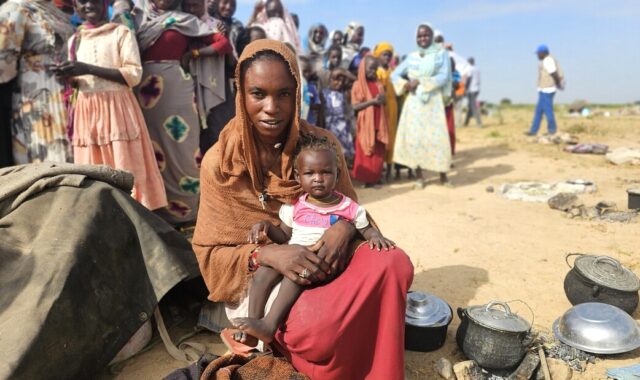Humanitarian organisations in eastern Chad are struggling to support more than one million refugees and returnees living in dire conditions. Funding cuts have forced many to close or drastically scale back operations, leaving displaced families without essential aid.
Since April 2023, over 870,000 Sudanese refugees and 300,000 Chadians have fled violence and famine in Sudan, seeking safety in Chad. The recent siege of El Fasher in Darfur alone pushed more than 80,000 people across the border. Women and children make up more than 80% of the Sudanese refugee population.
Crisis
Refugees face shortages of food, shelter, clean water, and medicine. Many have fled Sudan’s so-called “War on Women,” with survivors of sexual violence urgently needing protection and services that are now in short supply.
Fatimé, a local women’s leader, arrived at Abouteingué Camp in June 2023 after fleeing Geneina, West Darfur.
“The mercenaries burned our house and killed my father and two brothers,” she recalled. “After ten days of walking, we reached the Chadian border. But along the way, some people were robbed and beaten.”
She says camp conditions remain harsh: “Few shelters, not enough water, and children who are hungry.”
Even before the Sudan conflict, more than 6.9 million Chadians needed humanitarian assistance. Today, that number is higher. Chad ranks 125 out of 127 on the World Hunger Index, with rising food prices, disrupted trade, and climate impacts worsening the crisis. In eastern Chad alone, over 746,000 people face severe food insecurity.
“Humanitarian needs have risen sharply due to the influx of refugees and reduced global funding,” said Noël Allarabei, Interim Country Director for CARE in Chad. “With the rainy season now here, access to many areas is becoming increasingly difficult, and there is an increased risk of cholera.”
The first cholera case in eastern Chad was confirmed on July 13 in Dougui refugee camp, Ouaddaï Region. At least 422 suspected cases and 25 deaths have been reported. Aid agencies warn that prevention depends on clean water access, hygiene promotion, and treatment — all of which require funding.
Heavy rains have made road access to parts of Salamat, Sila, Wadi Fira, Ouaddaï, and Ennedi Est nearly impossible. Humanitarian flights, once used to reach cut-off areas, have been sharply reduced due to budget shortfalls.
To date, just 17% of the 2025 Humanitarian Response Plan for Chad is funded, leaving aid agencies struggling to respond to one of Africa’s most underreported humanitarian crises. Without urgent international support, both cholera prevention and basic relief for refugees, risk collapsing entirely.



































